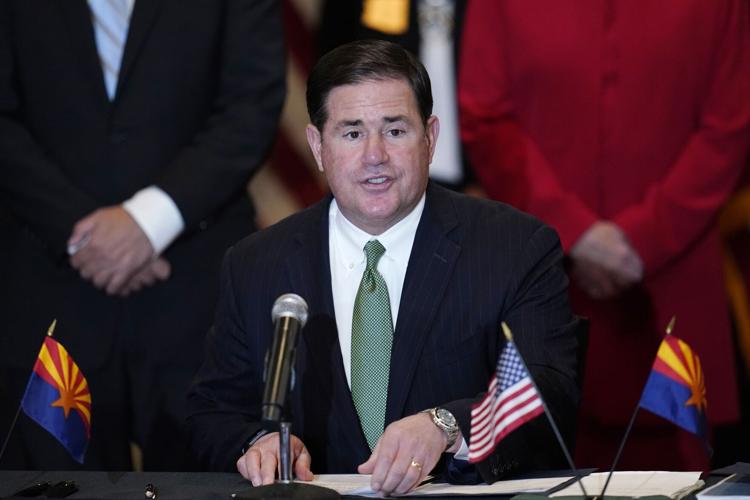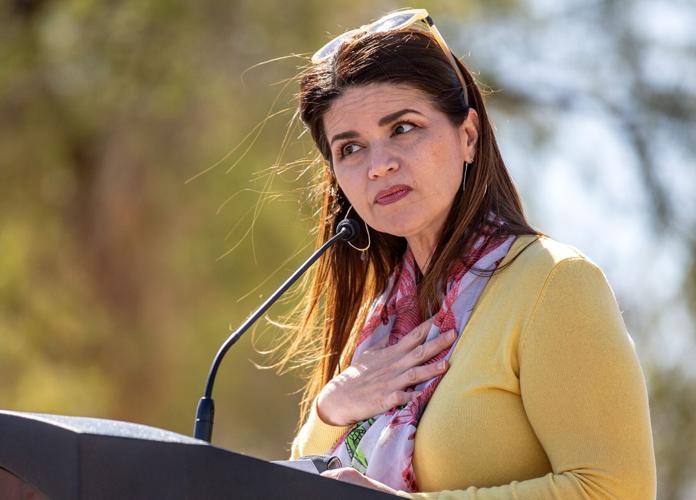Gov. Doug Ducey contends the Tucson City Council violated state law and his executive order when it mandated that employees be vaccinated or lose their jobs.
In a letter Wednesday, Anni Foster, the governor’s legal counsel, does not dispute that a state law barring cities from imposing vaccine mandates did not take effect. A Maricopa County judge ruled the legislation containing the wording was illegally adopted by state lawmakers. That ruling is being reviewed next month by the Arizona Supreme Court. In the meantime, the provision remains unenforceable.
But Foster told City Attorney Mike Rankin that the judge did not void other sections of the same bill, meaning they took effect as scheduled on Sept. 29.
She said what the judge left intact — and is now state law — is a requirement that an employer “shall provide a reasonable accommodation” when a worker seeks an exemption based on a claim of a “sincerely held religious belief.”
But Foster said the City Council’s action Tuesday said only that an employee may “request” a religious accommodation and that there will be an “interactive process to determine precise limitations.” That’s not enough, she said.
Issues of religious accommodations aside, Foster told Rankin that the City Council, before voting on the mandate, was not informed that there is still a valid executive order in effect from Ducey. It says that “no person shall be required by this state, or any city, town or county, to obtain a COVID-19 vaccine.” The only exception, she said, is that a licensed health care institution can impose such a mandate on its employees.
“This provision would apply to all employees, not just those that requested an accommodation,” Foster wrote, saying Ducey’s order precludes the council’s action. A violation of an executive order issued during a declared emergency “carries a criminal penalty,” she said.
The letter drew derision from Tucson Mayor Regina Romero.
“Gov. Ducey is more interested in playing politics with the vaccine than taking any action whatsoever to protect public health,” she said in a prepared statement. “This is just another politically motivated attempt to micromanage Tucson and deflect from his utter failure to manage the COVID-19 pandemic.”
As to the legal issues, Rankin told Capitol Media Services that he will soon send a written response to Foster.
“That response will explain that the city’s requirements comply with all applicable laws,” Rankin said. He said he will go into detail on the city’s policy for reviewing a claim for a religious accommodation versus what Foster said is the statutory requirement to grant it, no questions asked.
Rankin said he does not believe the governor has the authority he claims.
“The governor lacks the power to use an executive order to bar a local jurisdiction from exercising its own legal authority,” the city attorney said.
Ducey has had an often-acrimonious and sometimes hostile relationship with Romero. That has only been exacerbated during the pandemic, as the Democratic mayor challenged some of the Republican governor’s actions — and inactions.
In fact, it was a public threat by Romero and Kate Gallego, her Phoenix counterpart, to pursue mask mandates last year that eventually led to Ducey rescinding his directive blocking such local actions.
The new Tucson policy, approved on a 4-3 vote, says workers who are not vaccinated by Dec. 1 will be served a notice of intent to terminate their employment. A final decision would be made by a supervisor by Dec. 17.
This came after the council in August adopted a vaccine mandate for the city’s more than 4,000 workers, with the penalty of a five-day unpaid suspension.
Enforcement was postponed in September following an opinion by Republican Attorney General Mark Brnovich that the move would violate the new state law.
In the interim, however, Maricopa County Superior Court Judge Katherine Cooper voided that language. So, city officials again started down the path of figuring out how to begin enforcing the vaccine requirement.
While Ducey is going after Tucson, he is not pursuing Pima County, which also adopted its own vaccine requirements on Tuesday.
Unlike Tucson, the county is making that a mandate only for its employees who work with vulnerable populations, including health care workers, those who work with children or the elderly, and employees of the Pima County jail and Juvenile Detention Center. Those who are not fully vaccinated by Jan. 1 are subject to disciplinary action, up to losing their jobs.
Foster said even that also appears to run afoul of Ducey’s executive order, which permits exemptions only for employees of licensed health care institutions.
County Administrator Chuck Huckelberry said the list of who has to be vaccinated is justified.
For example, he said if there is an outbreak of COVID in a jail unit, the only place that could have come from is an employee who brought it in.
Employees who inspect nursing homes also should be vaccinated to ensure they are not causing infections, Huckelberry said.
He also said the county’s policy for a religious exemption mirrors the one adopted by Tucson — which Foster contends violates the law. He said the key there is that the belief be “sincerely held.” “So you just can’t make it up,” Huckelberry said.
“We’ve seen emails going around from various groups or employees or union members that say, ‘Here’s what you say,’” he explained. “Well, that won’t work.”
Foster told Capitol Media Services that she has not reviewed the Pima County action and may have concerns she will address with county officials.







